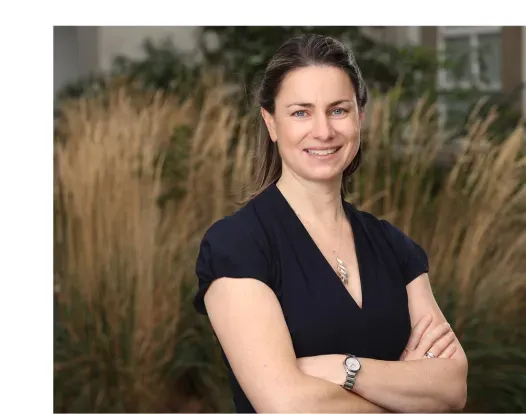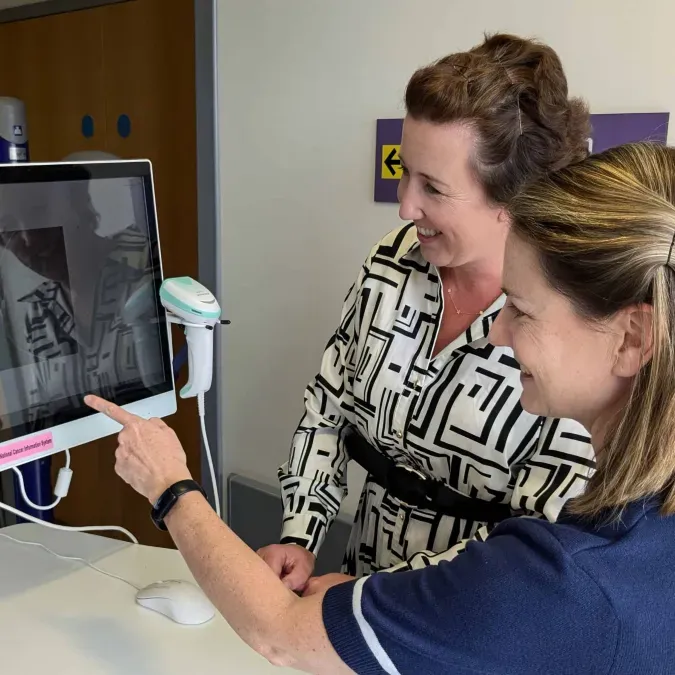These researchers have dedicated their careers to finding new treatments and cures for people with cancer.

When she gave birth to her daughter, Dr. Higgins’s career as a physician-scientist was still in its own infancy. And—much like any newborn—a growing career demands time and nurturing. Fortunately, Dr. Higgins received two Conquer Cancer grants, enabling the new mom to dedicate protected time for clinical research and ultimately helping to drive advances in earlier detection and better treatments for patients with breast cancer.

What motivated you to dedicate your career to cancer research?
MH: When I was 17 years old, my father was diagnosed with glioblastoma, an aggressive type of brain tumor. I had always wanted to be a doctor, but after my father’s diagnosis, I wanted to be an oncologist specifically. I completed my medical training in Ireland and then came over to the U.S. for further training in fellowship. The influence of my father’s experience with cancer and what my family went through really motivated me to pursue a career in cancer research.
What does conquering cancer look like to you?
MH: I think that can be interpreted in many ways. For me, I would hope that, for every patient, there’s something I can do for them and their families, starting at diagnosis and ultimately throughout their cancer journey. We all would love to be able to cure cancer for our patients. We also know that’s not always going to be possible. But every year, we are contributing to improvements that can have an impact on patients and improve the lives of people with cancer. I think an important part of conquering cancer ought to be providing high-quality cancer care to patients around the world, including those in low- and middle-income countries (LMICs).
What makes donors so important for cancer research, and what sets Conquer Cancer apart?
MH: I can speak personally to the impact that Conquer Cancer funding had on my research through receiving the Young Investigator Award and Career Development Award. Both awards enabled me to have the secure research time necessary to help advance clinical research for patients with breast cancer. I also brought several of our research learnings back to patients in Ireland and was able to help build a growing research community here.
How did you come to focus on breast cancer specifically, and how was research mentorship impactful for you?
MH: I enjoyed most aspects of oncology, but I suppose breast cancer was of particular interest to me in that it related largely to women. I was fortunate to happen upon some influential research mentors who guided me in breast cancer research. In particular, I was always drawn to my wonderful teachers in the medical field. I loved how they treated patients, and I learned from their interactions. I wanted to be like them, and when I came upon people who not only treated their patients beautifully but also furthered research and contributed to treatment advances, I thought, “Wow, I’d like to do that, too.”
A great research mentor is someone who gives you extra time, who goes that extra mile, who really cares and invests in you and helps you to progress. The best mentors thrive on seeing their mentees succeed. Teaching and supporting the next generation of oncologists in Ireland is among the parts of my job I enjoy the most.
Can you talk about your research, particularly in the context of biomarkers and breast cancer screening?
MH: We’re always looking at ways we can improve the journey of our patients with breast cancer. One increasing area of focus is to leverage non-invasive screening tools like biomarkers and liquid biopsies to detect and monitor cancer, even before current scans and blood tests can detect it. My research group is currently looking at unique exosome signatures in the blood of women with triple negative breast cancer. If we can detect how blood signatures change in response to cancer treatment, we can help identify who is responding well to treatment, as well as which patients may not be responding to treatment and need a change in therapy.
In what ways did receiving two Conquer Cancer grants help to accelerate your research?
MH: The research I conducted with these Conquer Cancer grants solidified my lifelong interest in improving the lives of people with advanced-stage breast cancer, which can be underrepresented in public awareness. I brought the learnings from this U.S.-based research back home to Ireland, where I’m involved in directing numerous clinical trials. We’re developing a growing research program not just for breast cancer but all cancers in our local area. Collaborating with several colleagues from diverse disciplines and patients themselves, our regional goal is to have a clinical trial option for every patient with cancer at every stage of their journey. We’re seeing more and more patients taking part in clinical trials at our site. We’re proud of that growth and the efforts we’re making to build a community of patients who are involved in clinical trials and informed about their options for treatment.
So I would say that my Career Development Award, which focused on hormone receptor positive breast cancer and in particular bone metastasis in women with metastatic breast cancer, it really gave me a lifelong interest in improving the life of people with stage 4 or metastatic breast cancer, which potentially is a little bit underrepresented in the public sphere.
What did your Conquer Cancer grants enable you to do that you wouldn’t have been able to without that funding?
MH: My Career Development Award came at an extremely busy time of my life. My daughter was born prematurely and quite unwell, and I was at the early stage and very steep learning curve of my junior career in oncology. That initial award from Conquer Cancer gave me the protected time I needed for research and collaborating with others in the field. Without this funding at such a critical time in my career, I would not have been able to jumpstart my research for patients with breast cancer.
What makes it so important to continue funding breast cancer research?
MH: We have made a lot of progress in the breast cancer space, due in no small part to donor-funded research. There are many women across the globe seeing those strides and having better outcomes because of that research. But it’s vital to remember that numerous patients around the world lack access to cancer care. Research efforts must continue so that patients with breast cancer everywhere can benefit from breast cancer research.
Can you speak to research progress for one type of cancer helping to accelerate progress in other areas of cancer care?
MH: In many ways, breast cancer was the poster child for targeted therapy—or treatment that works to control how cancer cells grow, divide, and spread without damaging healthy, normal cells. This approach has been revolutionized within the past couple decades, and the learnings from breast cancer research are gradually rolling out to other cancers. And it’s working the other way as well. We see that immunotherapies gained traction in other areas of cancer care and have been laterally applied to help treat patients with triple-negative breast cancer. So, there’s a two-way process where things we’ve learned from breast cancer research can be translated to other tumor types.
What does the future look like for patients with breast cancer?
MH: I think we’re going to see continued incremental improvements in treatments for women with breast cancer, and hopefully that will translate into not just improved survival, but also improved quality of life for our patients. And that’s becoming more and more important as our patients live longer than they ever have before.
Dr. Higgins’ Conquer Cancer grants were made possible by donations provided by the Breast Cancer Research Foundation.

